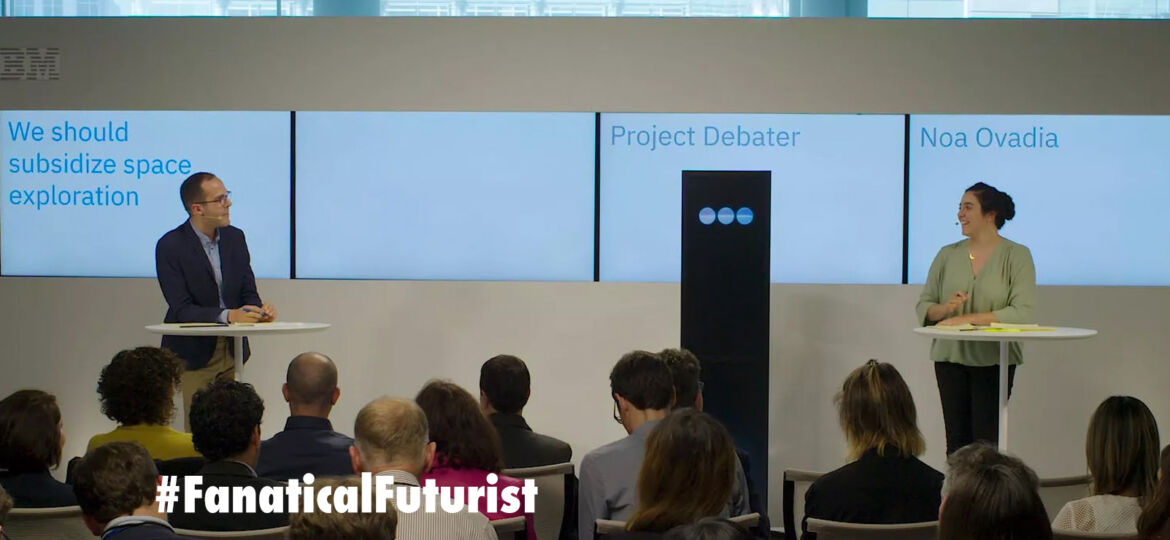
WHY THIS MATTERS IN BRIEF
The art of debating often helps humans learn new things and see topics from new perspectives, so an AI that can debate with humans on a vast range of topics could be incredibly useful.
Checkmate is a simple concept. It’s a final, decisive move in the game of chess that decides who wins and who looses the game – just like the move that IBM’s Deep Blue landed in 1997 to beat world chess champion Gary Kasparov. But debating isn’t like that, it’s highly subjective and an altogether different battle of wits where the question of who won is far from straightforward – much like the art of debating itself. Unlike chess debating also lacks clearly defined rules, which makes the fact that an Artificial Intelligence (AI) from IBM won a series of debates against seasoned human debaters at an event in San Francisco recently, according to an audience vote, all the more impressive.
Recently I’ve seen a whole host of games used to teach AI’s new things, such as Poker, that’s helping AI’s learn how to bluff and negotiate, apple picking from Google DeepMind hat’s being used to test AI’s natural killer instincts and see if they fight, which they did, and even pig wrangling AI’s from Microsoft that’s teaching them how to co-operate – something maybe my kids should learn how to do! But IBM’s newest AI, dubbed Project Debater, an AI based on IBM Watson, is an altogether different type of AI animal. The project first got going in 2014, and it’s designed to sift trusted information sources in order to provide valuable insights to humans, in the form of a debate, in an age flooded with information, misinformation, and information accused of being misinformation.
“Eventually, Project Debater will help people reason by providing compelling, evidence based arguments and limiting the influence of emotion, bias, or ambiguity,” states the project website, somewhat boldly. And if the event’s anything to go by then the platform might be on its way to living up to that claim.
According to a BBC report, Project Debater didn’t have access to the internet but instead had to rely on millions of stored documents, in the form of newspapers and academic journals. It also had no warning about what the subjects were going to be, although, admittedly, it was given a list of 100 possible debating topics that IBM thought it might end up trying to tackle. In the end the topics that came up were space exploration and telemedicine.
Its opponent in the first debate was against Noa Ovadia, Israel’s national debating champion in 2016 who recently started working with IBM, and the topic was public funding for space exploration – Project Debater debated funding space exploration, and Ovadia against. They each made a 4 minute statement followed by a 4 minute rebuttal and a 2 minute conclusion.
“It is very easy to say that there are more important things to spend money on, and I do not dispute this,” argued Project Debater in response to Ovadia’s argument that the money could be better spent. “No one is claiming that this is the only item on our expense list. But that is beside the point. As subsidising space exploration would clearly benefit society, I maintain that this is something the government should pursue.”
In this case the audience vote went in favour of the AI as being the more informative. Debater is still, naturally, a work in progress and it showed itself prone to repeating itself, and sometimes using peculiar phrases, but both of these are relatively minor quibbles when set against the backdrop of what it just managed to achieve, namely its ability to mine a hoard of information and present a coherent argument for, or against it. That said though, just as in human debating the quality of those arguments will always be limited by the quality of the data they’re drawn from.
The development it raises all kinds of questions about the future of information and opinion, as well as, for example, the role that a debating AI could have in the work place to help humans make more informed decisions. Although that said while Debater today isn’t biased there’s nothing saying that tomorrow it won’t be, but as the platform gets better at putting together insightful and coherent arguments, for or against, I for one think it could play a valuable role in tomorrow’s society, so I’ll be keeping an eye on it to see how it develops over the coming months and years.
















